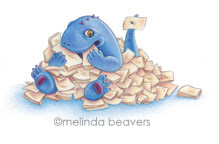Underestimating the slush.
Really, I shouldn't term this a "mistake," singular. The fundamental lack of understanding about how much slush there is feeds many, many of the most commonly made mistakes writers make--mistakes that hurt their chances of getting published, and often hurt their morale. Some of those mistakes are below; but first, a visualization excercise:
First, you need to realize that you
do not know what a pile of 15,000 manuscripts looks like.
Let's say you have a table that seats four. Imagine that in your kitchen at home. 1,000 manuscripts would cover that table in piles that would teeter. Tall piles. Take a moment to picture that.
Now fill the floorspace underneath and around the table with 4,000 more manuscripts. There is no room for chairs anymore. You can't reach the manuscripts in the middle of the table.
1,000 manuscripts fill your counter space; another 2,000 stuffs all your cupboards and shelf space. There is no longer any room for the coffeemaker or toaster; all of your food and crockery has been displaced to the living room. You cannot close the doors on your cupboards because of all the manuscripts spilling out of them. The kitchen is no longer about eating or cooking or
anything but
manuscripts.
The remaining 7,000 manuscripts cover all the remaining floor space in thigh-deep drifts. You cannot enter the room now. You can only reach those manuscripts at the doorway. Your kitchen is now less a "room" than a tank of paper.
Good. Keep that image in mind. Now imagine that you read 15,000 manuscripts
last year, and a good 50% were so inappropriate, illiterate, or crazy that thoughts of the hard work you did in college and the enormous debt you're still carrying from attending that schmancy institution made you nigh-suicidal. The cause of literature seemed futile and meaningless. You might as well hole up in a shack in Montana, awaiting the end of western civilization and stockpiling Joyce.
Now imagine that another 47% were just poorly-written, or aimed at the wrong age level, or derivative of much better (and better-known) writers, as well as having several concept/plotting/arc issues. If asked to say what was wrong with any of these, you would first have to think hard about how to prioritize the problems you saw, and then think hard about how to put them nicely. (Editors are picky, critical people, but they're also nice people. They don't want to hurt your feelings.)
The last 3% were nice, but manuscripts that no consumer was going to spend her money on when she's got so many other choices.
Which left you with 0.02% --3 manuscripts from 15,000-- that were worth publishing and ended up paying you back for the time it took to read them. (As well as, of course, the tens of thousands of dollars it took to publish them. Let's not forget about that.)
Did those 3 manuscripts pay you back for the time it took you to read the 14,997
other manuscripts in slush? No. Why do you have to read another 15,000 this year, when you have more than enough work to do (and agented manuscripts to acquire) to completely fill your 50-hour work weeks?
That's a
good question.
And yet we
do keep reading. Maybe it's 'hope springs eternal,' maybe it's the thrill of the chase. Maybe we're nuts.
Now see if you can answer some of these commonly asked questions yourself:
1. "Why is it so hard to get published?"
2. "Why are decline letters so impersonal?"
3. "How can some publishers decide not to reply at all unless they're interested in acquiring?"
4. "Why does every publisher have to have a different set of submission guidelines?"
5. "Why are they so slavishly attached to their submission guidelines?"
6. "How can they be so perfunctory about something that means so much to me?"


 Rant over. Thank you for listening.
Rant over. Thank you for listening.



